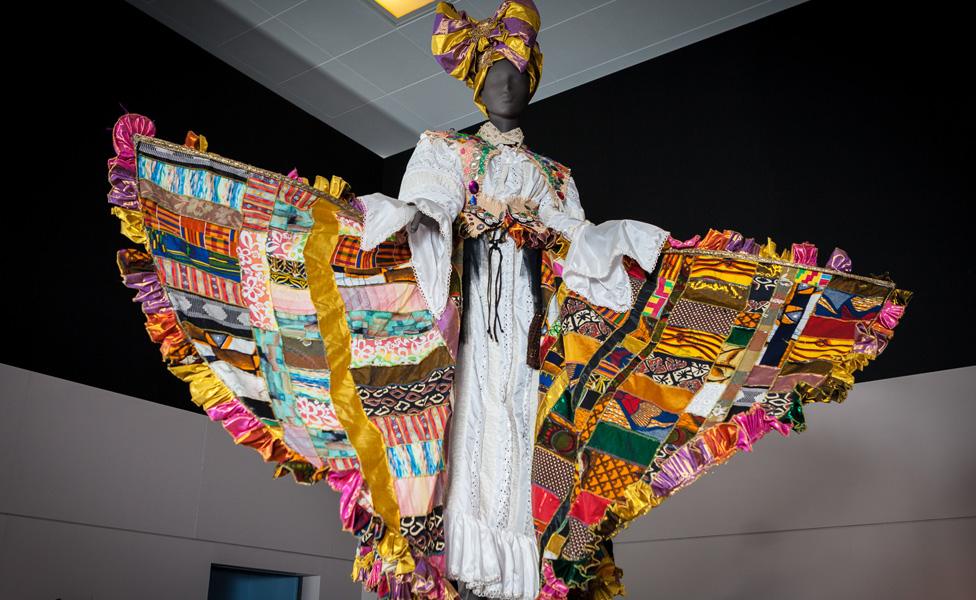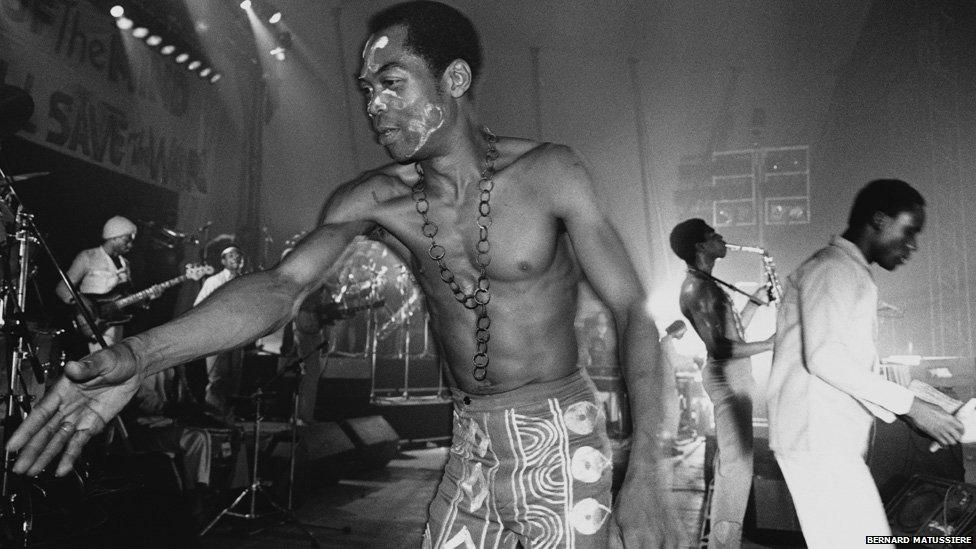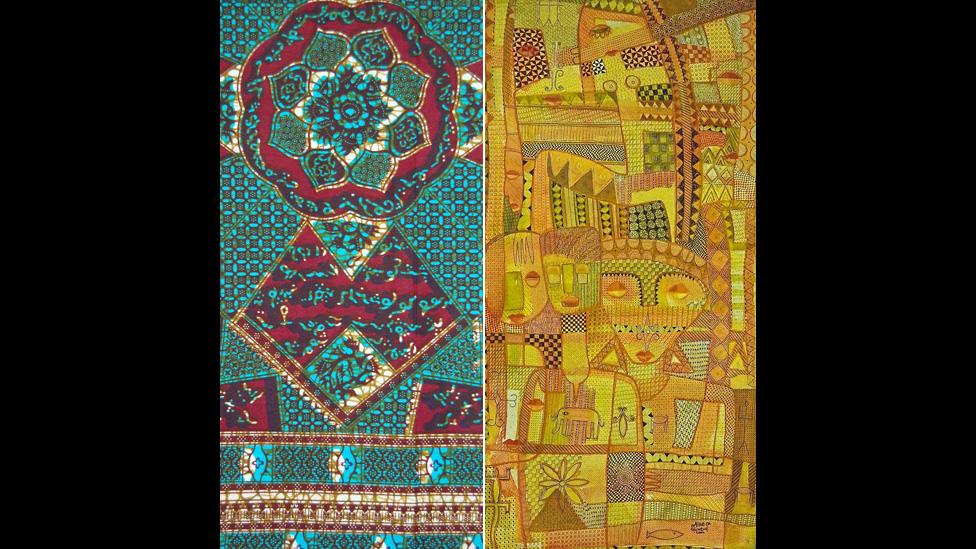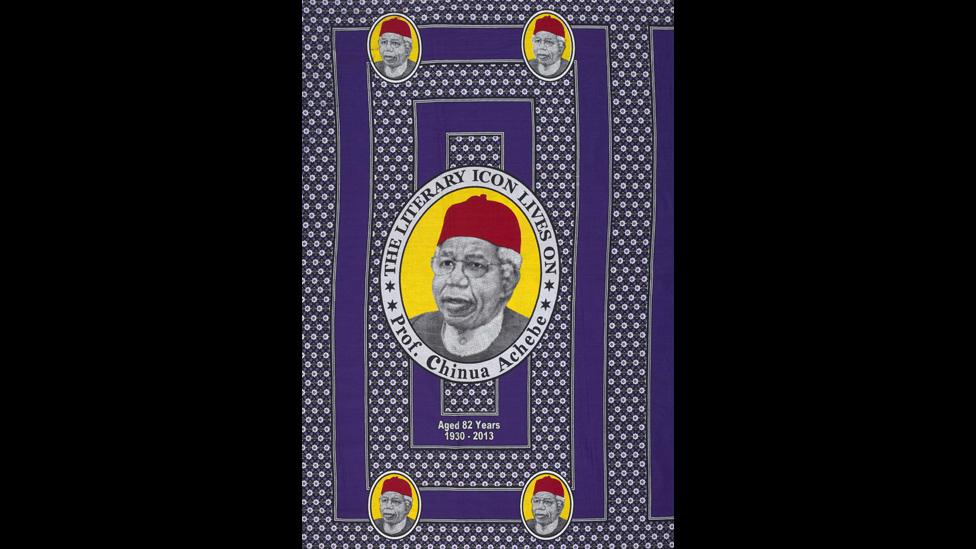West Africa: A forgotten heritage revealed
- Published

West African design fed into the carnival tradition in the Caribbean and in Britain
With the days growing shorter, the British Library hopes to offer the perfect artistic antidote to a chilly London autumn: a tour of a huge chunk of African culture.
Word, Symbol, Song sets out to appeal both to Britain's African diaspora and to people who have never visited any of the 17 nations involved.
There is no universally accepted definition of West Africa so, for the record, the exhibition covers Mauritania, Mali, Niger, Senegal, Guinea Bissau, Guinea, Burkina Faso, Togo, Benin, Cote d'Ivoire, Nigeria, Ghana, Cameroon, Sierra Leone, Liberia, the Gambia and Cape Verde.
It's quite a list, but curator Marion Wallace says diversity has been a strength, not a problem.
"West Africa is a dynamic and hugely creative place.
"We wanted to give a sense of what has happened in writing, in visual art and in music, right up to the present day. But by some reckonings there are, for instance, a thousand languages in West Africa - so we can only pick out the main strands.
"West Africa has a very old tradition of both storytelling and scholarship. All this was going on from at least the eleventh century.
"The oral tradition of telling folk tales is another major part of the exhibition. In West Africa, one of the best-known tales is the Sundiata epic from the Mali empire, but we also feature less familiar stories."

Afrobeat superstar Fela Kuti is one of the performers remembered in the exhibition
Yet the British Library has not created a dry display of dusty, ethnographic curiosities and folk literature. The display is helped hugely by the long tradition in West Africa of music, from the most ancient to the era of rap.
Janet Topp Fargion selected the musical content.
"We consulted widely, and the modern name which came up more than any other was the Nigerian superstar Fela Kuti - so we've given his material its own little room.
"Fela protested vehemently about the Nigerian government of the time and we wanted visitors to see how political his material can be.
"But his messages were carried in irresistible Afro-beat which he developed and which had a real flavour of jazz. As so often, it's a story of genres mixing and influencing one another.
"Fela Kuti often sang in pidgin English because that way his message could get to other West African nations, and travel even beyond that.
"But if politics isn't your thing, just enjoying the album covers is great fun."
Fela Kuti died in 1997 and Topp Fargion was keen to include more recent material too.
"The whole section is called Speaking Out, and I thought it was important to include music from contemporary female singers such as Angelique Kidjo, Rokia Traoré and Oumou Sangaré.
"They all sing about social issues which affect women and about human rights more broadly."

Textile designs old and new feature heavily (left), while Feminist Power series is a painting by contemporary Nigerian artists Nike Davies-Okundaye and Tola Wewe
But the display featuring the three singers is only moments away from one of the exhibition's quirkiest and most evocative items. From an old-fashioned gramophone horn emerge ancient recordings of Christian hymns, evoking the Nigeria and Ghana of colonial times. They are partly in English and partly in the Yoruba and Twi languages.
There are also examples of Highlife and gumbé music.
Writer and broadcaster Gus Casely-Hayford is an adviser to the exhibition. His own family roots are in Sierra Leone and, in what was then, the Gold Coast (now Ghana).
"Eighty years or so ago, my grandfather sat in the British Museum and wrote nationalist pamphlets against colonial rule in West Africa. So it's wonderful that now we have this material at the British Library: it's a really important exhibition.
"Perhaps down the years, Africa hasn't often enough been part of the schedule, but we can all learn from Word, Symbol, Song.
"Too many people have thought of Africa as primitive and a place without history, and that meant its importance was under-rated. But with this show, you'll get a real sense of the richness and complexity and intellectual depth of West African history.
"So this is a way to get people to rethink our relationship generally, with Africa and its history. And I hope that West Africans will come too and maybe think about what unites the region."
Marion Wallace says people who are keen readers may not realise they have already sampled West African literature.

A cloth made to mark the death of famed Nigerian writer Chinua Achebe in 2013
"There are obvious names such as Chinua Achebe and the Nobel Prize-winner Wole Soyinka, but the Booker Prize-winner Ben Okri is also in that tradition. And we've just had another Nigerian writer, Chigozie Obioma, on this year's Man Booker shortlist."
Wallace says even comic books and contemporary writing on the internet can have a West African flavour.
"And we could fill the whole exhibition space with stuff about Nollywood, the Nigerian film industry. But I'm confident people will be inspired to find out more."
So is the British Library taking a deliberate risk with a large exhibition devoted to West African culture? Superficially it might appear to have less popular appeal than their recent shows on underground comics or on Gothic literature.
But Wallace is sure there's a huge enthusiasm for Word, Symbol, Song.
"We're finding that even people who know very little about West Africa enjoy the show.
"It's a part of the world which often attracts negative headlines - and we don't ignore problems there - but we also show the huge creativity.
"I defy anyone to come to the exhibition and not think West Africa is a fascinating place.
West Africa: Word, Symbol, Song is on at the British Library in London until February 2016.